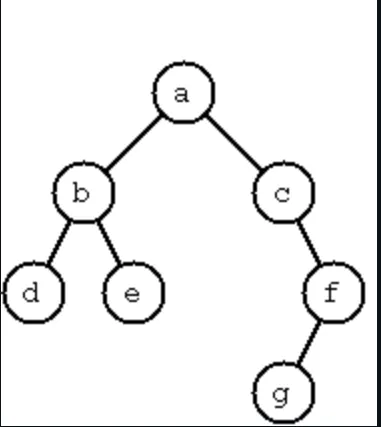August 27, 2024
P67 - A string representation of binary trees.
Binary trees can be represented as strings of the following type: a(b(d,e),c(,f(g,))).
Write a method which generates this string representation given tree as Nodes and Ends. And a method which does this inverse, i.e. given the string representation, construct the tree in the usual form.
> Node("a", Node("b", Node("d"), Node("e")), Node("c", End, Node("f", Node("g"), End))).convertToString()
a(b(d,e),c(,f(g,)))
> "a(b(d,e),c(,f(g,)))".convertToTree()
T(a T(b T(d) T(e)) T(c . T(f T(g) .)))kotlin
package org.kotlin99.binarytrees
import com.natpryce.hamkrest.assertion.assertThat
import com.natpryce.hamkrest.equalTo
import org.junit.Test
import org.kotlin99.binarytrees.P57Test.Companion.equalToTree
import org.kotlin99.binarytrees.Tree.End
import org.kotlin99.binarytrees.Tree.Node
fun Tree<*>.convertToString(): String =
when (this) {
End -> ""
is Node ->
value.toString() + if (left != End || right != End) {
"(" + left.convertToString() + "," + right.convertToString() + ")"
} else {
""
}
}
fun String.convertToTree(): Tree<String> {
fun String.drop(prefix: String): String =
if (!startsWith(prefix)) throw IllegalStateException("Expected '$this' to start with '$prefix'")
else drop(prefix.length)
fun String.parse(): Pair<Tree<String>, Int> {
val value = takeWhile { it != '(' && it != ',' && it != ')' }
var rest = substring(value.length)
return if (value.isEmpty()) {
Pair(End, 0)
} else if (!rest.startsWith("(")) {
Pair(Node(value), value.length)
} else {
rest = rest.drop("(")
val (left, leftLength) = rest.parse()
rest = rest.drop(leftLength).drop(",")
val (right, rightLength) = rest.parse()
rest.drop(rightLength).drop(")")
Pair(Node(value, left, right), value.length + leftLength + rightLength + 3)
}
}
return parse().first
}
class P67Test {
@Test fun `conversion to string`() {
assertThat(End.convertToString(), equalTo(""))
assertThat(Node("a").convertToString(), equalTo("a"))
assertThat(Node("a", Node("b"), Node("c")).convertToString(), equalTo("a(b,c)"))
assertThat(Node("a", Node("b", Node("d"), Node("e")), Node("c", End, Node("f", Node("g"), End))).convertToString(), equalTo(
"a(b(d,e),c(,f(g,)))"
))
}
@Test fun `conversion from string`() {
assertThat("".convertToTree(), equalToTree(End))
assertThat("a".convertToTree(), equalToTree(Node("a")))
assertThat("a(b,c)".convertToTree(), equalToTree(Node("a", Node("b"), Node("c"))))
assertThat("a(b(d,e),c(,f(g,)))".convertToTree(), equalToTree(
Node("a", Node("b", Node("d"), Node("e")), Node("c", End, Node("f", Node("g"), End)))
))
}
}
